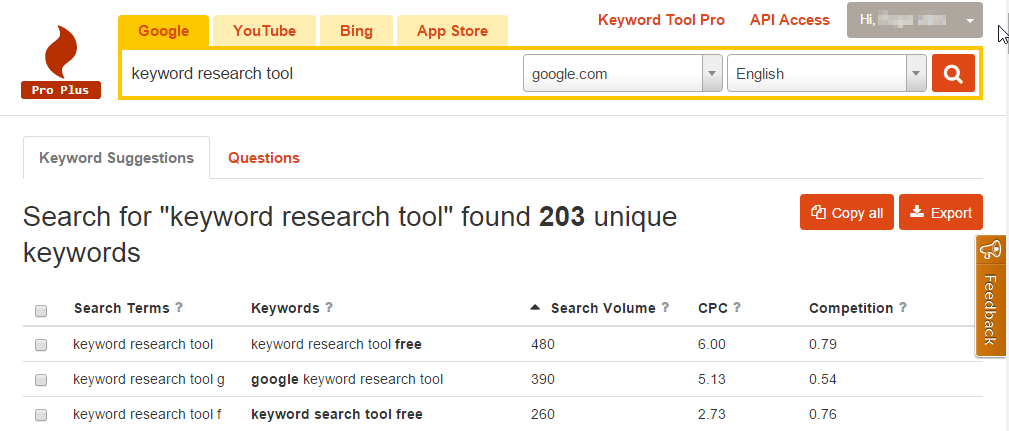Hi Houston people, Here is something cool and effective and useful tips for you regarding keyword search engine.
In this guide, you will learn all the functions of the tools I discussed below.
Let’s dive into it!
Finding and choosing the best keywords is not an easy task. In order to really optimize our content for the right terms, it is essential to use the best keyword search services. These will be discussed now.
A good keyword must meet requirements like that
- Be Relevant To The Topic We Or The Client Need,
- Search Volume (Or In The Near Future),
- Make It Easy/realistic To Get Listed In Google’s Top Results.
However, how do we find such expressions? Even with a thorough understanding of the market, we may not find the keywords that are most relevant to our consumers.
That’s why I’ll show you 10 keyword search techniques and tools to help you find the keywords that work best for you. Of course, there are countless others, but I usually use them for my daily SEO tasks.
1. The human keyword search engine
The first and most trivial keyword search method, of course, is to start writing down the keywords that come to mind first. You can spend a lot of time doing this – and it’s worth it.
But let’s not forget those who are close to our business. Be sure to ask our colleagues, if possible, our customers (to be discussed later), our suppliers. If we work in a suitable industry and maintain a good relationship, we will not miss our competitors.
2. Google Search and Autocomplete
If you already have the first keywords in your head or on paper, you might want to enter them into Google. This is what I do when I’m not familiar with an industry. This method has two outputs:
- Result Of Manual Search And
- The Autocomplete.
The benefit of regular search is that you can read about the topic in general and then delve deeper into the topic. Through this, we can gather a wealth of knowledge and vocabulary within a short period of time.
Google Autocomplete is a much more targeted search. We start typing the term you are looking for, and Google will complete or suggest terms that others have searched for in the past. Like this:
It also provides useful results for related searches at the bottom of SERPs (Google search results pages), where Google lists the terms that are often searched for by those who have searched for the keyword we are looking for.
3. Keywordtool.io – the keyword add-on
If you already have some head terms, you might want to add them to medium or long tail. Keywordtool.io is perfect for this task. This app will look for the keyword we specify to search for it in Google, YouTube, Bing, or the App Store by adding words or other words.
Keywords can be divided into 3 groups based on their length and specialization:
head: 1-word phrases (search engine optimization),
medium tail: 2-3 word terms (step by step search engine optimization),
long tail: 3+ word expressions (search engine optimization step by step pdf 2.0.)
So the head keyword is typically a 1-word term, the medium tail keyword has 2-3 words and long-tail phrases already have more than 3 words. The more specific expression is, the fewer people typically search for it. But in return, competition tends to be smaller for these terms. Therefore, it is worth searching not only for 1-word expressions but also for longer ones.
To do this, enter the head keyword and change the language to the one you want. Then run the search. It is easiest to copy the results (Copy all) to an Excel file and then look at them individually to see if they are really relevant results. Personally, I really like this tool because it throws in a lot of opportunities that I wouldn’t have thought of myself.
In the paid version, you can get instant search volume, CPC (Cost Per Click) and Adwords Competition right away. I use Google Keyword Planner for this.
4. Ubersuggest
We will get very similar results if we use Ubersuggest instead of Keywordtool.io. The two applications are practically the same.
The difference is that in Übersuggest, besides the language, we can specify which sources to run the search on:
- Web,
- Photo,
- News,
- Buying,
- Video, Or
- Recipes.
Keywordtool.io and Ubersuggest give similar results, but there is a slight difference between the results.
Pro tip: If you want to merge the results from both programs,
- open an excel
- copy all results into a single column
- select cells (stand in field A1 and use Ctrl + Shift + down arrow)
- Under the “Details” tab, select the “Remove duplicates” option.
Update: This device was purchased in 2018 by Neil Patel and has since redesigned its interface with the above images.
5. Google Keyword Planner
The best known and common keyword search engine is the Google Keyword Planner. I used 2 elements of the program when researching:
competitors analysis,
combine keyword lists.
When analyzing competitors, we have a simple thing to do, and Google investigates which ad groups on a given domain your site deals with.
Based on the first 4 ad groups, The Pitch Education shows that
- SEO marketing,
- SEO,
- search engine optimization, and
- online marketing
categories/keywords are significant on the page. So we’re probably working on that.
The second method is a technical trick. If there are keywords,
- which I am aware of,
- consist of two terms, and
- these can be combined,
Then I simply do it with Google Keyword Planner.
Then I continued to read the topic using the combined keywords.
I’ve tried the Bing Keyword Research Tool before, but since I didn’t want to put a piece of code on the page, I couldn’t use it. It was quite disappointing for me, so I forgot about it.
6. Ahrefs
The ahrefs associated with one of my favorite tartalommarketinghez my page and search engine optimization for very large database. Keyword search services are also excellent. Just look at it a little differently.
In this case, it is worth checking the websites of known competitors of the companies. I use two elements. The first is Top Content. Here you can see which content performed best on social networks. In addition, the titles allow us to infer our own keywords. If you were a competitor of The Pitch, you can see our prominent titles here.
Another part that is worth checking out is the Anchor Cloud. That is the most commonly used terms to which a link to a page is placed.
7. Google Search Console
The Webmaster Tools, or formerly known as Webmaster Tool is another big personal favorite. Amazingly useful tool. This is why I am regularly amazed at how many sites are not yet connected to Google Analytics. By using this tool we can find out that
- what keywords were searched for on our page,
- which page (s) appeared
- what CTR (clickthrough rate) they clicked on to us
- where we ranked for keywords, etc.
All in all, it’s one of the best ways to get to know those who find us or find us organically. As we learn about the topics we can be interested in, we can find lots of new keywords.
This is just one of the many benefits of the Search Console, which we will cover in more detail in a later blog post.








